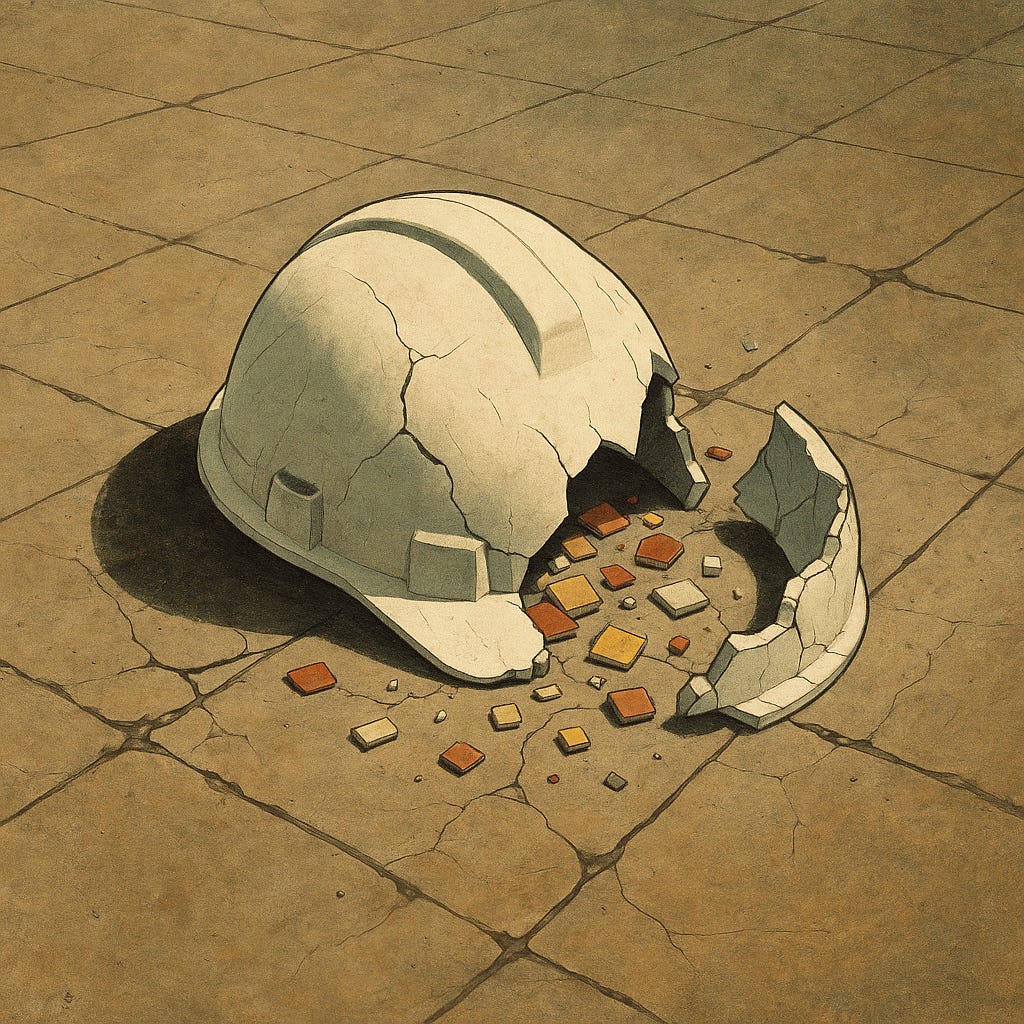The Job is Dead.
As the boundaries and meanings of work dissolve, this issue examines how the idea of "the job" has collapsed—from stable factory roles to fungible, shifting tasks—and asks what survives in its place.
There was a time—recent enough to be remembered, far enough to feel unreal—when people described themselves by their jobs without irony. “I’m a machinist.” “She’s a lawyer.” “He’s with the bank.” Not just employment, but identity. Your job anchored you: to place, to routine, to social status, to a future. It dictated your schedule and your aspirations. It was the deal society made with you: work hard, climb the ladder, retire with dignity.
The deal is off.
Today, the word job floats strangely. It might mean a month-long project, a series of gig economy hits, an endless freelance hustle, or a full-time role with no security, progression, or even clarity. For some, it’s still a path to ambition. For others, it’s just rent money.
What was once stable has become conditional, contingent, and—frequently—meaningless.
The job has been sliced into tasks, abstracted into metrics, and dislocated from the lives it once ordered. It isn’t just about work. It’s about a shift in how we live, relate, and imagine the future.
The collapse of the job-as-we-knew-it has consequences beyond paychecks: it fragments identities, dissolves communities, and hollows out the stories we tell about success. It also opens strange new possibilities—lives less tied to employers, more fluid, potentially more autonomous—but at a cost many haven’t chosen and can’t afford.
We won’t romanticise the past. The “job” has always been unevenly distributed and often oppressive. But something is undeniably ending. And in its place, we’re left navigating a new terrain: part precarious, part promising, mostly undefined.
In this issue of Brewed for Work, we will explore the slow collapse of “the job” as a stable, identity-shaping institution—and what’s replacing it. From the promise of lifelong employment to today's gig-fueled, project-based work, we trace how economic, technological, and cultural shifts have fragmented what work means. This is an attempt to map that terrain. Not to offer neat answers, but to acknowledge the grief and disorientation of a generation watching the foundation crack beneath them—and to ask: if the job is dead, what survives?
Today’s Issue at a Glance:
The Death and Rebirth of "The Job"
How the Traditional Job Disintegrated
New Reality: Working in Fragments
Meaning After the Dream
Navigating Life in the Aftermath
So grab your favorite mug, and let's get brewing!
Welcome to Brewed for Work, 🔒subscribers-only🔒 offering by The Percolator dedicated to professional growth and upskilling. Each week we share essays, insights and resources to aid you in your work-life.
🚀
Now, you can Upgrade your Subscription for Free when you Invite your Friends to Subscribe to The Percolator
The Death and Rebirth of "The Job"
The idea of "the job"—singular, stable, defining—was born out of industrialisation. Factories, railroads, bureaucracies: these were the engines that created not just employment but the very notion of the job as identity.
A job was a slot in a machine, yes, but it was also a place in the world. It gave structure to the day, direction to ambition, and—crucially—a narrative to a life.
The post-WWII boom in the West elevated this structure. In the United States, union-backed contracts secured pensions and healthcare. In Europe, strong social safety nets and worker protections turned employment into a pathway to prosperity. A job wasn't just a means to survive; it was how you participated in society. You bought a home. You sent your kids to school. You shook hands with the future.
This arrangement wasn't perfect. It excluded women, racial minorities, and migrants for much of the 20th century. It often demanded conformity, submission, and endurance. But within that narrow bargain, the job became an anchor for millions.
By the 1980s, however, this arrangement was under assault. Neoliberal economic reforms, beginning with Reagan and Thatcher, shifted the burden of risk from employer to employee. Lifetime employment was reframed as entitlement. "Flexibility" became a euphemism for disposability. The old career ladder turned into a rope bridge over a canyon of volatility.
» Then came the digital revolution.
Technology decoupled work from location. Globalisation outsourced whole industries. Platforms like Amazon and Uber began converting labour into piecework, repackaged in the language of "freedom."
» Jobs became gigs; employment became a marketplace of tasks.
Today, the outlines of "the job" are almost unrecognisable. Titles change yearly. Contracts are time-boxed. Increasingly, a "job" is a placeholder—until the next pivot, the next layoff, the next move.
And yet, the cultural idea of the job persists. Parents still ask children what they want to be. Politicians still promise "job creation." LinkedIn still prompts you to describe your "current position." But these echoes mask a deeper transformation.
The job, as a defining institution, is dying.
And in its place?
A loose federation of work: projects, hustles, callings, temp contracts, creator economies. Not all bad. Not all better. But undeniably different. The death of the job is not the end of work. It's the end of a particular promise: that employment is synonymous with identity, stability, and meaning.
Keep reading with a 7-day free trial
Subscribe to The Percolator to keep reading this post and get 7 days of free access to the full post archives.





